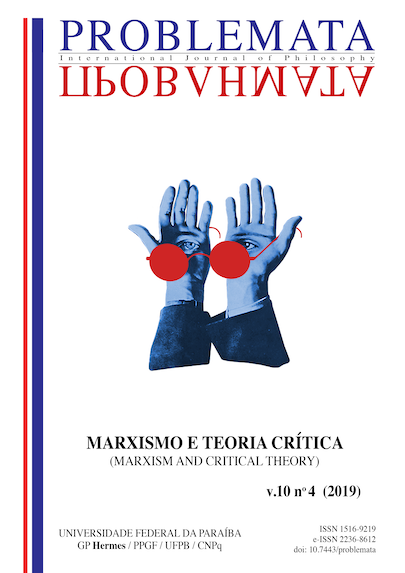MARX IN HESSEN:
A COMPLEX AND DISPUTED FIELD
DOI:
https://doi.org/10.7443/problemata.v10i4.49707Keywords:
Emancipation, Democracy, Marxism, CapitalismAbstract
In the German state of Hessen, in its most diverse cities, other localities and institutions, were the scenes of important discussions and theoretical productions of Marx’s thought. The Institute for Social Research in the city of Frankfurt, where the so-called Critical Theory developed, is perhaps the most well-known reference. But also at the Department of Social Sciences of the University of the same city, at the Institute for Marxist Studies and Research in Frankfurt, as well as at the University of Marburg and the Socialist Office in the city of Offenbach, important contributions were made. In a way, the theoretical divergences that have become explicit in these nuclei of study, research, debate and, theoretical production express unresolved issues and challenges. Democracy and emancipation are themes that have received exemplary antagonistic approaches in Frankfurt and Marburg. All, however, deal with themes from the relevance and insufficiency of Marx's thought as an instrument of understanding and transformation of reality. [Editor’s translation].
Downloads
References
HIRSCH, J. Neo-Biedermeier. Links-netz, S. 1-5, Jan. 2017. Verfügbar unter: http://www.links-netz.de/K_texte/K_hirsch_biedermeier.html.
______. Radikaler Reformismus. In: BRAND, U. et al. (Hrsg.). ABC der Alternativen: von “Ästhetik des Widerstands” bis “Ziviler Ungehorsam”. Hamburg: VSA, 2007. S. 182-183. Verfügbar unter: https://www.rosalux.de/publikation/id/995/abc-der-alternativen/.
______. Teoria materialista do Estado. Trad. Luciano Cavini Martorano. Rio de Janeiro: Revan, 2010.
Downloads
Published
Issue
Section
License
Authors who publish with this journal agree to the following terms:
- Authors retain copyright and grant the journal right of first publication with the work simultaneously licensed under a Creative Commons Attribution License that allows others to share the work with an acknowledgement of the work's authorship and initial publication in this journal.
- Authors are able to enter into separate, additional contractual arrangements for the non-exclusive distribution of the journal's published version of the work (e.g., post it to an institutional repository or publish it in a book), with an acknowledgement of its initial publication in this journal.
-
- Authors are permitted and encouraged to post their work online (e.g., in institutional repositories or on their website) prior to and during the submission process, as it can lead to productive exchanges, as well as earlier and greater citation of published work (See The Effect of Open Access).





